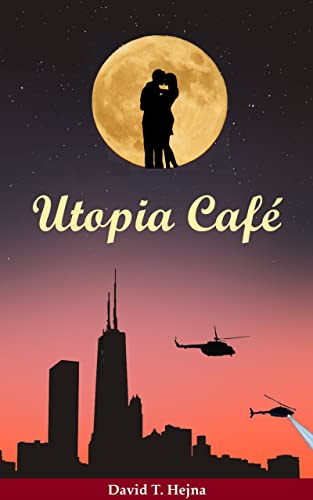Utopia Cafés have popped up all over the place, serving free coffee to citizens of the Republic of Equality. However, complimentary caffeine isn’t enough to engender loyalty in everyone. Izzy Fanella is part of an underground freedom movement hoping to restore more capitalistic, conservative values in a country that has completely shifted from the principles on which it was founded. When Izzy meets Tom Hardy, a future leader in the Party, she senses in him something deeper than his blind allegiance to the state. They cautiously cultivate a relationship, each withholding a fair amount of dangerous secrets. Slowly, the pair come to realize that their beliefs are more similar than different. If they can form a trust, they might be able to help each other in the elusive search for freedom and love. However, when anyone might be an informant, falling in love is the easy part.
Reading like a bizarre dystopian future tangled with a sepia-toned historical fiction novel, Utopia Café paints a drab picture of the near future of American proletariat society. The scenery, though set in the Chicago area, could be mistaken for Cold War era Soviet Union, complete with government appointed Block-Minders, Political Police, and quirky vestiges of language left over from decades past. History and current events provide a compelling and thorough muse, leaving little to be imagined in a place where equality is valued over all else. The result is a fearful land where freedom doesn’t ring and hard work doesn’t pay off.
Delving into such sensitive and impassioned subject matter is a precarious tightrope walk for any author, however David Hejna throws caution to the wind, boldly forging ahead without even the comfort of a balancing pole. There is no subtlety or softening of the edges as the failures of an extremely progressive government, propped up by its own egalitarian ideals, are laid bare. While the plot does feature a budding romance between two intelligent college students, their relationship won’t be enough to win over readers whose political ideologies differ from the book’s unsympathetic observations. This polarizing, yet captivating novel is one that you’ll either like or loathe based entirely on where you land on the left-to-right scale. For freedom-loving capitalists who value common sense over popular social movements, Utopia Café is a cautionary tale whose message is crystal clear.







